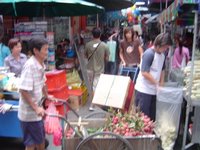 These words faded into the distance as the pick-up truck took our luggage and us down the track from Our Jungle House towards the bus stop a couple miles away. Faith wrote in one of her emails that "this is the kind of place you miss afterwards" and she's right. The six days that we spent in Khao Sok have been an interesting, amusing and heartwarming experience of how a community survives and prospers at the edge of what we call civilisation. There's no lack of any creature comforts at all, at a price, in fact the visitors demand them. For example, a family booked out of Our Jungle House after less than 24 hours because it has no air-conditioning in the houses. Most of the local people, though, live simply; they have satellite tv, electricity and running water, but their homes are small and simly furnished, most have smallholdings and grow fruit and vegetables, many make an income from the tourists.
These words faded into the distance as the pick-up truck took our luggage and us down the track from Our Jungle House towards the bus stop a couple miles away. Faith wrote in one of her emails that "this is the kind of place you miss afterwards" and she's right. The six days that we spent in Khao Sok have been an interesting, amusing and heartwarming experience of how a community survives and prospers at the edge of what we call civilisation. There's no lack of any creature comforts at all, at a price, in fact the visitors demand them. For example, a family booked out of Our Jungle House after less than 24 hours because it has no air-conditioning in the houses. Most of the local people, though, live simply; they have satellite tv, electricity and running water, but their homes are small and simly furnished, most have smallholdings and grow fruit and vegetables, many make an income from the tourists.Iat is a good example. He picked us up at SuratThani station on our arrival and drove us the 100 km or so to Khao Sok. On the way we learned that he was born and lived in the next village to khao Sok, went to the local primary school (walking the 6km each way along the developing Highway 401). He pointed out all the different crops growing around us - rubber, rambutans, papayas, durian, oil palm, and served us our supper in the restaurant that night. We saw him quite a lot on other days, too. He led a "night safari" for tourists, did some local driving and spent time with his friends and family in the village itself.

There's only one street, so it wasn't easy to miss people. The main thing that he pointed out in his conversation about how things have changed is that now most children go to and from school by motorcycle. This is true; every day the little fleet set off in the morning and returned in the evening.
We also became friends with a young man who's a deaf mute. We met when we were looking for a path to local wat. We managed to explain what we were looking for and he managed to explain how we could find it. After that we saw him most days, either in the plantations, the shops or passing on his motorcycle. He always waved exuberantly at us, and we even got to have a sort of discussion about whether a brightly coloured bird that we'd all been looking at was a kingfisher or not. He signed kingfisher by waving his hand like a fish swimming while dropping the other hand down to it very fast like a diving bird.
So you see, it was a very fascinating place - and that's even without the plants and animals!
 We're in Bangkok airport now, just about to go through immigration and boarding for Sydney. We shared the sleeper train from SuratThani with many people, boxes of cured eggs, crates of live crabs etc. and spent this morning exploring the maze that is Chinatown.
We're in Bangkok airport now, just about to go through immigration and boarding for Sydney. We shared the sleeper train from SuratThani with many people, boxes of cured eggs, crates of live crabs etc. and spent this morning exploring the maze that is Chinatown.Now I know exactly where to go if I want someone to mend ANYTHING I own that's broken.

No comments:
Post a Comment